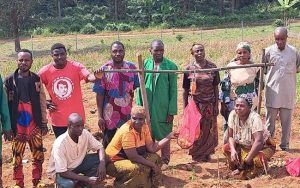The Genetically Modified (GM) Potato project ongoing in Nigeria has concluded its first-year multi-locational confined trial in three locations with the Biotech potatoes showing significant yield advantage over conventional varieties planted in the country.

Preliminary results from the three locations namely Kuru and Bokkos in Plateau State and Kusuku in Taraba State show that the biotech potatoes had a uniform yield advantage of over 300 percent when compared to the best performing variety in the country when no fungicide was applied.
The trials is under the Feed the Future Global Biotech Potato Partnership (GBPP), a five-year project, coordinated by Michigan State University, that focuses on the commercialization of late blight disease resistant potatoes in farmer-preferred varieties in Bangladesh, Indonesia, Kenya, and Nigeria.
The African Agricultural Technology Foundation (AATF) and the International Centre for Potatoes are other strategic partners in the project which is implemented in Nigeria by the National Root Crop Research Institute (NRCRI), Umudike.
Dr Charles Amadi, The GBPP Principal Investigator, said that he was excited by the promising results which showed clearly that biotech potatoes can contribute significantly to the mitigation of devastation caused by recurrent outbreaks of late blight in the potato-growing areas of Nigeria. He added that this will help increase yields and secure farmers’ investments and the livelihoods of stakeholders in the potato value chain.
Dr Shuaibu Kahya, the GBPP Trial Manager, noted that “late blight is the most destructive of all potato diseases. It affects both potato foliage in the field and tuber in the storage which can destroy a crop, leading to a 100 percent loss. In Nigeria, Potato is grown predominantly in Jos, Plateau State, Obudu in Cross River State, and Mambila Plateau, Taraba State, during the rainy season”.
According to him, potato farmers in these areas suffered from late blight disease in their fields for more than 30 years. “In 2021/22, NRCRI scientists evaluated late blight resistance potato known as biotech potato (these biotech lines have 3R gene from potato wild relatives). The modified potatoes were planted along with non-biotech potatoes as control, at the confined field trial at Kuru and Bokkos (Plateau State) and Kusuku, Mambila Plateau (Taraba State).
In the first year multilocational confined field trial, 80-100 percent of the control potato (non-biotech potato) died of late blight diseases. But the biotech potato performed well, with 100 percent of the modified plants showing no late blight symptoms on the foliage. The harvested biotech potato tubers did not show any difference in tuber size and shape compared to the non-biotech potato.
The Trial Manager listed the benefits of the GM potatoes to include a greater number of tubers than the non-biotech potato (which is responsible for the significant yield), reductions in production cost and environmental impact, as well as the potential to influence marketability.
Some of the farmers who participated in the trials were full of praise for the modified variety, saying that it out-performed their conventional varieties and called on the federal government of Nigeria to expedite action on the commercialisation of the biotech potato to ensure farmers have unhindered access to its tuber seedlings.
Mrs. Rosemary Samson, the Chairlady of Kusuku Potatoes Farmers Association, Sardauna Local Government Area of Taraba State, said she and her fellow farmers have been planting potatoes for years but have never witnessed such high yielding and very productive varieties as the biotech potatoes.
“The past years we have been farming potato on this land, I have farmed potato for more than 20 years, the problem in the land is poor yield and insect destruction and rustiness of the potato. This variety is completely different from our past experience. This one yields very good and rustiness is not like in the past.”
Another farmer, Genesis Johnson, the Chairman of potato farmers from Gembu, said he came to witness the harvest of the Irish potato that is resistant to pest and disease, and he is very impressed with what he saw.
“Previous years we have been planting Irish potato we have not witness a potato that is resistant to pest and disease. We spend so much on chemical spray to reduce diseases and insect attacks yet what we get at the end of the day is not proportional to the investment.
“With this biotech potato, we are encouraged that hope for bumper harvest is possible and that with little investment our efforts will yield good results. We are appealing to the federal government to avail us this variety of Irish potato, it will give us more income and more food on our table,” he said.
According to Johnson, “this new variety can be planted twice, first because it is early maturing, so with the duration of rainfall we can cultivate twice, first cropping and second cropping because out of the cultivars they have brought most of them are disease resistant compared to the ones we have been using which is affected by late blight and rotting.”
“If the government will provide us with this resistant variety we will be happy and go into production on larger scale. I have been farming Irish potatoes for more than 30 years but have never seen anything like this. It is one of the foods we eat, it provides us with income in a short period of 60 – 90 days. It is marketable compared to the rest,” Johnson added.
The Feed the Future Global Biotech Potato Partnership project is implemented in four countries – Kenya, Bangladesh, Indonesia and Nigeria. It is coordinated by Michigan State University, and involves various partners including the National Root Crop Research Institute, Umudike, the African Agricultural Technology Foundation (AATF) and International Potato Centre (CIP).
